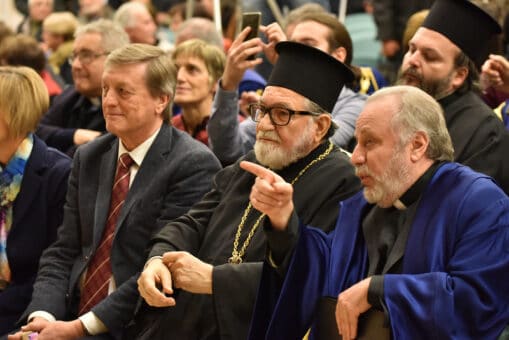
Oct 30, 2020 | Non categorizzato
Just days after the Metropolitan’s death, we publish the tribute prepared by Monsignor Piero Coda, professor of Trinitarian Ontology at the Sophia University Institute of Loppiano (Italy) where he was Dean from 2008 to 2020.  “He had a vision: a door was open in heaven…”. With these words, taken from the book of Revelation, the Metropolitan Gennadios Zervos, Orthodox Archbishop of Italy and Malta, loved to describe – with a gaze full of wisdom – the meeting between Patriarch Athenagoras and Chiara Lubich. Athenagoras used to say, “because if the door is now open, we are called to go inside together: to share in the wonder and joy of the divine gift of Unity”. I cannot find more appropriate words to describe the flame that lit the heart and illuminated the action of Metropolitan Gennadios. He was an extraordinary and tireless apostle of Unity between the Church of the East and the Church of the West that we have known since the Second Vatican Council until today. His work began way back in 1960, when he arrived in Italy from his native Greece, sent by Patriarch Athenagoras. A humble and ardent disciple of the Eastern Church with its two-thousand-year-old tradition. A tradition impersonated by the prophetic figure of Patriarch Athenagoras, and in which Metropolitan Gennadios had been formed from the time of his studies at the historic Theological School of Chalki, an experience he had shared with the future Patriarch Bartholomew; and in the charism of unity given by the Holy Spirit to Chiara Lubich for the whole Church of our time, beyond confessional distinctions. He thus lived, as an active and discreet protagonist, the great progress inaugurated by the reconciliation between Rome and Constantinople at the close of Vatican II, sealed by the historic embrace between Pope Paul VI and Patriarch Athenagoras in Jerusalem. He continued then with tenacity and without hesitation on this road, contributing in a unique way, in Italy, to the mutual knowledge of the two sister Churches. Along the journey he joyfully nourished himself with the light of the charism of unity. Metropolitan Gennadios animated his ministry in the Orthodox Diocese of Italy and Malta, with this spirit leading the diocese with foresight as Archbishop – the first after almost three centuries – to a magnificent flowering in the constant search for communion with the Catholic Church and in a sincere dialogue with all. Finally, as if it were the precious legacy he wanted to leave us, he intensely desired the Ecumenical Chair Patriarch Athenagoras-Chiara Lubich at the Sophia University Institute in synergy with the Ecumenical Patriarchate of Constantinople: “a sign” – he stressed on the day of the inauguration – “of our infinite love for these two extraordinary protagonists of the dialogue of love”. With amazement and gratitude, I am a witness of how close to his heart this last initiative was. For him, it was a new contribution so that the ‘miracle’ rained down from Heaven might continue. ‘Miracle’ is how he described the meeting between Athenagoras and Chiara – Chiara had become a living bridge between the Patriarch of Constantinople and the Pope of Rome, Paul Vl. He even considered it indispensable to the ecumenical journey towards full and visible unity: “the love between Athenagoras, Chiara and Paul VI “- he repeated – “is such a powerful reality that no one can erase it anymore, because it is the presence of Jesus in their midst”. With immense gratitude we gather from his hands the witness he transmits to us. As we remembering him , we are deeply moved by the words of Patriarch Bartholomew who wanted to celebrate his many and luminous charisms in which we rejoiced, and which we now contemplate in a fuller light: “among them the greatest are humility and gentleness, peace and wisdom, and the greatest of all love and faith towards Mother Church”.
“He had a vision: a door was open in heaven…”. With these words, taken from the book of Revelation, the Metropolitan Gennadios Zervos, Orthodox Archbishop of Italy and Malta, loved to describe – with a gaze full of wisdom – the meeting between Patriarch Athenagoras and Chiara Lubich. Athenagoras used to say, “because if the door is now open, we are called to go inside together: to share in the wonder and joy of the divine gift of Unity”. I cannot find more appropriate words to describe the flame that lit the heart and illuminated the action of Metropolitan Gennadios. He was an extraordinary and tireless apostle of Unity between the Church of the East and the Church of the West that we have known since the Second Vatican Council until today. His work began way back in 1960, when he arrived in Italy from his native Greece, sent by Patriarch Athenagoras. A humble and ardent disciple of the Eastern Church with its two-thousand-year-old tradition. A tradition impersonated by the prophetic figure of Patriarch Athenagoras, and in which Metropolitan Gennadios had been formed from the time of his studies at the historic Theological School of Chalki, an experience he had shared with the future Patriarch Bartholomew; and in the charism of unity given by the Holy Spirit to Chiara Lubich for the whole Church of our time, beyond confessional distinctions. He thus lived, as an active and discreet protagonist, the great progress inaugurated by the reconciliation between Rome and Constantinople at the close of Vatican II, sealed by the historic embrace between Pope Paul VI and Patriarch Athenagoras in Jerusalem. He continued then with tenacity and without hesitation on this road, contributing in a unique way, in Italy, to the mutual knowledge of the two sister Churches. Along the journey he joyfully nourished himself with the light of the charism of unity. Metropolitan Gennadios animated his ministry in the Orthodox Diocese of Italy and Malta, with this spirit leading the diocese with foresight as Archbishop – the first after almost three centuries – to a magnificent flowering in the constant search for communion with the Catholic Church and in a sincere dialogue with all. Finally, as if it were the precious legacy he wanted to leave us, he intensely desired the Ecumenical Chair Patriarch Athenagoras-Chiara Lubich at the Sophia University Institute in synergy with the Ecumenical Patriarchate of Constantinople: “a sign” – he stressed on the day of the inauguration – “of our infinite love for these two extraordinary protagonists of the dialogue of love”. With amazement and gratitude, I am a witness of how close to his heart this last initiative was. For him, it was a new contribution so that the ‘miracle’ rained down from Heaven might continue. ‘Miracle’ is how he described the meeting between Athenagoras and Chiara – Chiara had become a living bridge between the Patriarch of Constantinople and the Pope of Rome, Paul Vl. He even considered it indispensable to the ecumenical journey towards full and visible unity: “the love between Athenagoras, Chiara and Paul VI “- he repeated – “is such a powerful reality that no one can erase it anymore, because it is the presence of Jesus in their midst”. With immense gratitude we gather from his hands the witness he transmits to us. As we remembering him , we are deeply moved by the words of Patriarch Bartholomew who wanted to celebrate his many and luminous charisms in which we rejoiced, and which we now contemplate in a fuller light: “among them the greatest are humility and gentleness, peace and wisdom, and the greatest of all love and faith towards Mother Church”.
Piero Coda
Oct 29, 2020 | Non categorizzato
Just like Jesus, we too can approach our neighbour without fear and be by their side walking together through difficult and joyful times, appreciating their gifts, sharing material and spiritual goods, encouraging, giving hope and forgiving. The art of teaching During the pandemic, like many of my colleagues, I started giving lessons online. In the beginning it was a novelty so there was a high level of participation among the children but with time some of the craftier ones found ways to do something else and slowly lost interest in the lessons. Faced with such a variety of responses to my commitment to them, I tried not to show preference or approval but tried to highlight the importance of taking personal responsibility which was certainly more difficult in those times of crisis. The real dilemma, however, was when I had to pass judgment because it was clear to me that the written work they sent me lacked originality and was probably copied. One day I asked the pupils how they would act in my place. It was an opportunity for them to really reflect on their own participation or non-participation. And what really moved me was that they made their own judgment. I don’t think I have ever experienced a life lesson like it before. (G.P. – Slovenia) Overcoming the crisis together We were unable to have children and this “defeat” meant that we both focused on our careers but after 24 years, our marriage was in crisis. It was as if he had slipped away from me. When I understood that we were moving from young love to adult love, I decided I had to make the first move and asked my husband to come with me to see a counsellor. When we got back home, he was visibly upset and confessed that he had no idea I had been suffering so much and apologized. I asked God for help and I prayed. It felt right that I should leave the job that had led me to excel in my career and I tried to be more present at home, more affectionate and understanding. It took a lot of kindness and patience but now our relationship has matured and is no longer tied to expressions that had seemed so important to us when we were young. Today I hear myself saying things that would have been unthinkable a few years ago, like: “I couldn’t live without you”. We are like two companions on a journey each striving to realize God’s plan on both of us united. (S.T – Italy) A teenage grandson During the time when schools were closed due to the pandemic, my teenage nephew became more aggressive than ever. We live in the same house and I would say that, as a grandmother, I had brought him up, sometimes replacing his parents; I also accompanied him through difficult moments with his school friends and teachers. One day his reaction to some food he didn’t like was quite offensive. My first thoughts were to judge him harshly but instead I decided to be the first to love by going into the kitchen to prepare a quick dessert that I knew he liked. When he recognised the smell coming from the oven, he came up to me, hugged me and asked for forgiveness. I didn’t say anything to him, and just acted as if nothing had happened. Then he started to open up and we had the kind of dialogue we hadn’t had for a long time. When his parents came back, to my surprise, he said that, unlike his classmates, he felt privileged to have his grandmother living in the same house. (P.B. – Slovakia) No more complaints Often, instead of being grateful to God for what we have and sharing it with those who don’t have, we complain about the food we do not like, how small our houses are, certain clothes we don’t have and so on. We forget that Jesus believes that everything we do to our brother is done to Him. It was Hurricane Mary that made me and other friends change our attitude, giving us a strong impulse to look at the needs of others. It was also Hurricane Mary that had caused a lot of suffering and destruction in our country. Among the many people who had been left homeless was the family of one of my classmates: his parents and their six children who had been living in a basement flat had lost everything. Together with the other classmates I made a list of the things they needed and we organised a collection with the much appreciated help of the altar boys in my parish. When we went to hand over the “providence” we had collected, we were really moved to see with what joy and emotion our friend and his family received everything. (Némesis – Puerto Rico)
edited by Stefania Tanesini
(taken from Il Vangelo del Giorno, Città Nuova, year VI, no.5, September-October 2020) _______ 1 C. Lubich, Parola di Vita October 1995, in Parole di Vita, edited by F. Ciardi (Works of Chiara Lubich 5), Città Nuova, Rome 2017, pp. 564-565.
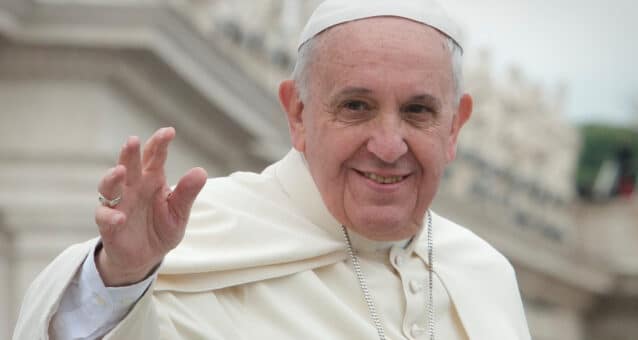
Oct 28, 2020 | Non categorizzato
The meeting will be held online from November 19th to 21st. Maria Gaglione, from the organising team, collected the stories of the participants: economists, researchers, scholars and university professors, entrepreneurs, students, activists and changemakers from 115 countries around the world. 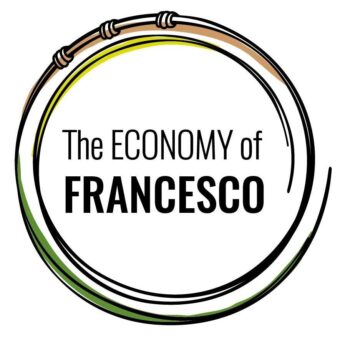 “It is essential to train and support the new generations of economists and entrepreneurs” to adopt a new model of development that “does not exclude but includes” and does not generate inequalities. Speaking to economists and bankers, the Pope highlighted the urgency of an “ecological reconversion” of the economy and stressed the decisive role of young people. He invited them to discuss these issues in Assisi (Italy), where St Francis “stripped himself of everything to choose God as the guiding light of his life, he made himself poor with the poor (…). His choice of poverty gave rise to a vision of the economy that is very up to date”. The meeting, entitled Economy of Francesco, will be held online from November 19th to 21st. Maria Gaglione, from the organising team, collected the participants’ stories: “The young people who responded to the Pope’s call are economists, researchers, scholars and university professors, entrepreneurs, students, activists and changemakers from 115 countries around the world. They are themselves “builders” of a fairer, more fraternal economy, aiming at inclusion. The universities, businesses and communities where they operate are “workshops of hope”, as the Pope defines them. Their motto is “No one left behind”, because they want an economy that leaves no one behind. In this way, they resemble St Francis who chose a new life to dedicate himself to those who are the least”.
“It is essential to train and support the new generations of economists and entrepreneurs” to adopt a new model of development that “does not exclude but includes” and does not generate inequalities. Speaking to economists and bankers, the Pope highlighted the urgency of an “ecological reconversion” of the economy and stressed the decisive role of young people. He invited them to discuss these issues in Assisi (Italy), where St Francis “stripped himself of everything to choose God as the guiding light of his life, he made himself poor with the poor (…). His choice of poverty gave rise to a vision of the economy that is very up to date”. The meeting, entitled Economy of Francesco, will be held online from November 19th to 21st. Maria Gaglione, from the organising team, collected the participants’ stories: “The young people who responded to the Pope’s call are economists, researchers, scholars and university professors, entrepreneurs, students, activists and changemakers from 115 countries around the world. They are themselves “builders” of a fairer, more fraternal economy, aiming at inclusion. The universities, businesses and communities where they operate are “workshops of hope”, as the Pope defines them. Their motto is “No one left behind”, because they want an economy that leaves no one behind. In this way, they resemble St Francis who chose a new life to dedicate himself to those who are the least”.  Saint Francis preferred giving to the logic of profit. What does it mean to make of one’s work and study a gift for others? “These young people choose to give their lives, their skills, their talents, to give everything a deeper meaning. Many, having undertaken a study or work activity, at a certain point choose to change their ways. Joel Thompson is an electronic engineer. Inspired by Pope Francis’ Encyclical Laudato Si, he decided to commit to environmental and social justice, and now lives and works in an indigenous village in Amazonian Guyana where he is involved in training in 16 villages. Diego Wawrzeniak is a Brazilian social entrepreneur and member of the Inkiri community. He has worked in the financial sector and after creating a startup he decided to join his community to develop a local bank and currency and now follows projects that combine innovation, entrepreneurship and local economy. Maria Carvalho, of Indian descent, grew up between Saudi Arabia and Canada and is involved in energy and climate policy in London. She says that St Francis’ message of fraternity inspired her life and that she chose to become a social scientist to fight poverty and inequality”. Because of the pandemic the event, planned for March, will be held online in November. What format will it take? The original method of the event is preserved – an opportunity to highlight the voice, the thought, the perspectives of young economists and entrepreneurs. For months, about 1200 young people from all continents have been working on the major themes of today’s economy, trying to reconcile apparently unrelated dimensions: finance and humanity; agriculture and justice; energy and poverty, etc. The November appointment will be the fundamental stage of a process that has already begun to report the experience and work of the past few months. The proposals and reflections will be given space in the various sessions of the online programme, where young people will be in dialogue with internationally renowned economists and experts. There will be links from the symbolic places of Assisi and moments in which young people will tell their stories. Art, poetry, meditation, local realities are also included in the programme. A large part of the programme will be available in streaming by connecting to the website www.francescoeconomy.org The Pope has told us that he will be present.
Saint Francis preferred giving to the logic of profit. What does it mean to make of one’s work and study a gift for others? “These young people choose to give their lives, their skills, their talents, to give everything a deeper meaning. Many, having undertaken a study or work activity, at a certain point choose to change their ways. Joel Thompson is an electronic engineer. Inspired by Pope Francis’ Encyclical Laudato Si, he decided to commit to environmental and social justice, and now lives and works in an indigenous village in Amazonian Guyana where he is involved in training in 16 villages. Diego Wawrzeniak is a Brazilian social entrepreneur and member of the Inkiri community. He has worked in the financial sector and after creating a startup he decided to join his community to develop a local bank and currency and now follows projects that combine innovation, entrepreneurship and local economy. Maria Carvalho, of Indian descent, grew up between Saudi Arabia and Canada and is involved in energy and climate policy in London. She says that St Francis’ message of fraternity inspired her life and that she chose to become a social scientist to fight poverty and inequality”. Because of the pandemic the event, planned for March, will be held online in November. What format will it take? The original method of the event is preserved – an opportunity to highlight the voice, the thought, the perspectives of young economists and entrepreneurs. For months, about 1200 young people from all continents have been working on the major themes of today’s economy, trying to reconcile apparently unrelated dimensions: finance and humanity; agriculture and justice; energy and poverty, etc. The November appointment will be the fundamental stage of a process that has already begun to report the experience and work of the past few months. The proposals and reflections will be given space in the various sessions of the online programme, where young people will be in dialogue with internationally renowned economists and experts. There will be links from the symbolic places of Assisi and moments in which young people will tell their stories. Art, poetry, meditation, local realities are also included in the programme. A large part of the programme will be available in streaming by connecting to the website www.francescoeconomy.org The Pope has told us that he will be present.
Claudia Di Lorenzi
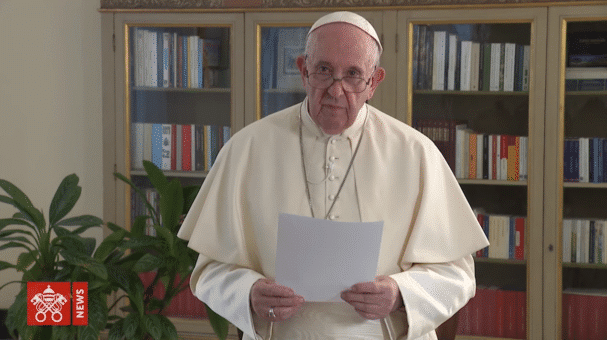
Oct 26, 2020 | Non categorizzato
Pope Francis sent a message to the participants of the conference of EcoOne, an ecological initiative of the Focolare Movement. Pope Francis sent a message to the participants of the conference of EcoOne, an ecological initiative of the Focolare Movement, which took place from 23 to 25 October in live streaming from the Mariapolis Centre of Castel Gandolfo (Italy).  “I offer cordial greetings to all taking part in this international Meeting being held as part of the year-long observance of the fifth anniversary of the Encyclical Letter Laudato Si’. I express my gratitude to EcoOne, the ecological initiative of the Focolare Movement, and to the representatives of the Dicastery for Promoting Integral Human Development and the Global Catholic Climate Movement who have cooperated in making this event possible. Your Meeting, with its theme “New Ways towards Integral Ecology: Five Years after Laudato Si’”, addresses a relational vision of humanity and care for our world from a variety of perspectives: ethical, scientific, social and theological. In recalling the conviction of Chiara Lubich that the created world bears within itself a charism of unity, I trust that her perspective can guide your work in the recognition that “everything is connected” and that “concern for the environment needs to be joined to sincere love for our fellow human beings and an unwavering commitment to resolving the problems of society” (Laudato Si’, 91). Among such problems is the urgent need for a new and more inclusive socio-economic paradigm that reflects the truth that we are “a single human family, fellow travelers sharing the same flesh, children of the same earth which is our common home” (Fratelli Tutti, 8). This solidarity with one another and with the world around us demands a firm willingness to develop and implement practical measures that foster the dignity of all persons in their human, family and work relationships, while at the same time combating the structural causes of poverty and working to protect the natural environment. Achieving an integral ecology calls for a profound interior conversion on both the personal and communal level. As you examine the great challenges facing us at this time, including climate change, the need for sustainable development and the contribution religion can make to the environmental crisis, it is essential to break with the logic of exploitation and selfishness and to promote the practice of a sober, simple and humble lifestyle (cf. Laudato Si’, 222-224). It is my hope that your work will serve to cultivate in the hearts of our brothers and sisters a shared responsibility for one another as children of God and a renewed commitment to be good stewards of his gift of creation (cf. Gen 2:15). Dear friends, once again I thank you for your research and your cooperative efforts to seek new ways that lead to an integral ecology for the common good of the human family and the created world. In offering my prayerful best wishes for your deliberations during this meeting, I cordially invoke upon you, your families and your associates God’s blessings of wisdom, strength and peace. And I ask you, please, to remember me in your prayers”.
“I offer cordial greetings to all taking part in this international Meeting being held as part of the year-long observance of the fifth anniversary of the Encyclical Letter Laudato Si’. I express my gratitude to EcoOne, the ecological initiative of the Focolare Movement, and to the representatives of the Dicastery for Promoting Integral Human Development and the Global Catholic Climate Movement who have cooperated in making this event possible. Your Meeting, with its theme “New Ways towards Integral Ecology: Five Years after Laudato Si’”, addresses a relational vision of humanity and care for our world from a variety of perspectives: ethical, scientific, social and theological. In recalling the conviction of Chiara Lubich that the created world bears within itself a charism of unity, I trust that her perspective can guide your work in the recognition that “everything is connected” and that “concern for the environment needs to be joined to sincere love for our fellow human beings and an unwavering commitment to resolving the problems of society” (Laudato Si’, 91). Among such problems is the urgent need for a new and more inclusive socio-economic paradigm that reflects the truth that we are “a single human family, fellow travelers sharing the same flesh, children of the same earth which is our common home” (Fratelli Tutti, 8). This solidarity with one another and with the world around us demands a firm willingness to develop and implement practical measures that foster the dignity of all persons in their human, family and work relationships, while at the same time combating the structural causes of poverty and working to protect the natural environment. Achieving an integral ecology calls for a profound interior conversion on both the personal and communal level. As you examine the great challenges facing us at this time, including climate change, the need for sustainable development and the contribution religion can make to the environmental crisis, it is essential to break with the logic of exploitation and selfishness and to promote the practice of a sober, simple and humble lifestyle (cf. Laudato Si’, 222-224). It is my hope that your work will serve to cultivate in the hearts of our brothers and sisters a shared responsibility for one another as children of God and a renewed commitment to be good stewards of his gift of creation (cf. Gen 2:15). Dear friends, once again I thank you for your research and your cooperative efforts to seek new ways that lead to an integral ecology for the common good of the human family and the created world. In offering my prayerful best wishes for your deliberations during this meeting, I cordially invoke upon you, your families and your associates God’s blessings of wisdom, strength and peace. And I ask you, please, to remember me in your prayers”.
Focolare Communications Office
Oct 26, 2020 | Non categorizzato
The restrictions that have been imposed due to the pandemic, particularly the lockdowns, have often caused or increased tensions in personal relationships. Forgiveness is needed. But forgiveness requires strength, courage and practice. Families often fall apart because they don’t know how to forgive. Long-standing hatreds maintain divisions between relatives, social groups and peoples. At times, some people even teach others not to forget the wrongs done to them and to nurse their desire for revenge… Blind resentment poisons the soul and corrodes the heart. Some people think that forgiveness is weakness. It isn’t. It’s the expression of extreme courage and of true love in its most genuine form, because it is the least self-interested. ‘For if you love those who love you, what reward do you have?’ Jesus said, because anyone can do this. But you must, ‘Love your enemies’ (Mt 5: 43-47). We too are asked to learn from him and have the love of a father, the love of a mother, a merciful love for whoever we meet during the day, and especially those who make mistakes. The New Testament asks even more of those called to live a spirituality of communion, in other words Christian spirituality: ‘Forgive each other’ (Col. 3:13). Mutual love demands almost a pact among us: to be ready to forgive one another always. This is the only way we can contribute to building universal fraternity.
Chiara Lubich
Taken from the Word of Life of September 2002
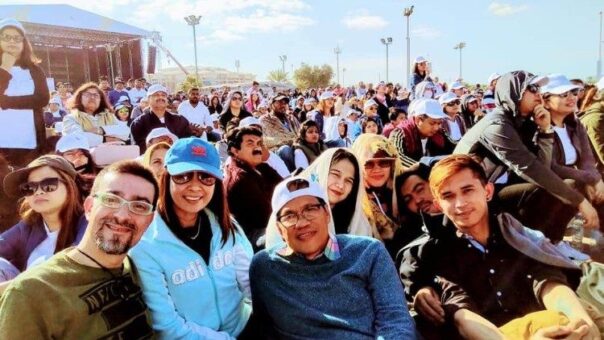
Oct 23, 2020 | Non categorizzato
In this special year aimed at highlighting the principles set out in the encyclical Laudato si’, we come across Abdullah Al Atrash, a young Italian-Syrian entrepreneur in the United Arab Emirates. Though a non-believer, he is a member of the Economy of Communion of the Focolare Movement. The company he runs employs mostly Asian and African migrants, guaranteeing them a salary and social support measures, all while observing the highest possible safety for both employees and the environment, even during the pandemic. 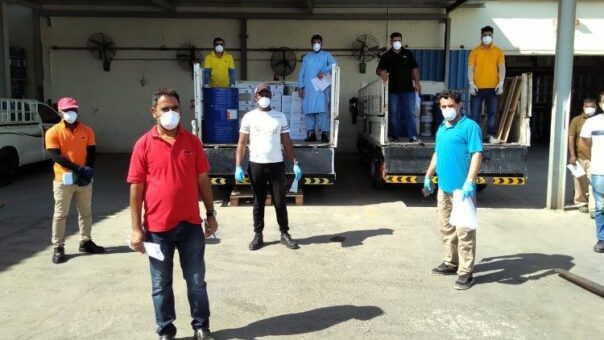 They are Pakistani, Indian, Nepalese, Filipino, Nigerian, Cameroonian, Senegalese. What they share in common is a past marked by severe poverty that forced them to leave their homeland and family to emigrate, and a present that seeks to keep them from experiencing exploitation and new hardships. They number about 212, the employees of MAS Paints, a paint manufacturer established in 1989 in Italy that relocated in 2000 to Dubai in the United Arab Emirates (UAE). Nine out of ten of the UAE’s 10 million inhabitants are foreigners. Abdullah Al Atrash, the company’s General Manager, tells Vatican News about his “colleagues and friends of the company” founded by his father and uncle. Hearing this young 42-year-old entrepreneur with a degree in economics and business from the University of Ancona and a Master’s degree obtained at the Adriano Olivetti Institute whose headquarters are in Italy’s Marches region, calls to mind the reflections on work contained in Pope Francis’s Encyclical Laudato Si’. There, the Pontiff highlights how work is a “necessity”, a “part of the meaning of life on this earth, a path to growth, human development and personal fulfilment” (no. 128). “Other than ourselves” “Underlying every form of work,” the Pope further elucidates, “is a concept of the relationship which we can and must have with what is other than ourselves” (LS, no. 125). Arriving in 2005 in Dubai, Abdullah observed, studied, and, in a certain way, made his own the world of migrant workers. “It was a trauma for me to see how these people were living. Everyone from poorer countries go to work in other nations, whichever one it may be. They then need to send a lot of money home to support a truly high number of relatives, because they all have an extended family system, that is, they help even their parents, siblings, cousins. So, I did a calculation,” he explains. “Based on that calculation, on average each one of them had to maintain 10 people, not only from the point of view of money to cover expenses, but money that truly makes a difference between life and death because in many of these countries the State does not help for various reasons: there is serious poverty, war, political instability, ethnic or religious tension. These people tend to put in long hours, doing jobs that are quite fatiguing, for really low wages. I saw cases in which people were working in construction earning a wage equal to about € 130 – € 150 per month, making it impossible for them to send money home.” A culture of sharing In his Encyclical Letter of 2015, the Pontiff points out that “helping the poor financially must always be a provisional solution in the face of pressing needs” (no. 128). He goes on to clarify that “the broader objective should always be to allow them a dignified life through work” (ibid.). An atheist, married to a Catholic and the father of two children, Abdullah, together with his wife Manuela, is involved in the Focolare Movement and its Economy of Communion initiative. It was founded in 1991 by Chiara Lubich to promote a type of economic culture marked by sharing, and proposes the living of a different lifestyle than that of the dominant capitalistic system. The life experience of this Italo-Syrian thus led him to the point of “being aware of the costs of life as well as the world in which they [the migrants] were living” and of adopting concrete measures for his employees. This was not easy, he confesses, but “I multiplied the base wage by 5 so that they could live with the utmost dignity. And I decided to pay not only their medical expenses of any kind, but those of the entire ‘extended’ family, as well as for the education of their children, supporting them up to university – because without education it would be difficult for them to find work.”
They are Pakistani, Indian, Nepalese, Filipino, Nigerian, Cameroonian, Senegalese. What they share in common is a past marked by severe poverty that forced them to leave their homeland and family to emigrate, and a present that seeks to keep them from experiencing exploitation and new hardships. They number about 212, the employees of MAS Paints, a paint manufacturer established in 1989 in Italy that relocated in 2000 to Dubai in the United Arab Emirates (UAE). Nine out of ten of the UAE’s 10 million inhabitants are foreigners. Abdullah Al Atrash, the company’s General Manager, tells Vatican News about his “colleagues and friends of the company” founded by his father and uncle. Hearing this young 42-year-old entrepreneur with a degree in economics and business from the University of Ancona and a Master’s degree obtained at the Adriano Olivetti Institute whose headquarters are in Italy’s Marches region, calls to mind the reflections on work contained in Pope Francis’s Encyclical Laudato Si’. There, the Pontiff highlights how work is a “necessity”, a “part of the meaning of life on this earth, a path to growth, human development and personal fulfilment” (no. 128). “Other than ourselves” “Underlying every form of work,” the Pope further elucidates, “is a concept of the relationship which we can and must have with what is other than ourselves” (LS, no. 125). Arriving in 2005 in Dubai, Abdullah observed, studied, and, in a certain way, made his own the world of migrant workers. “It was a trauma for me to see how these people were living. Everyone from poorer countries go to work in other nations, whichever one it may be. They then need to send a lot of money home to support a truly high number of relatives, because they all have an extended family system, that is, they help even their parents, siblings, cousins. So, I did a calculation,” he explains. “Based on that calculation, on average each one of them had to maintain 10 people, not only from the point of view of money to cover expenses, but money that truly makes a difference between life and death because in many of these countries the State does not help for various reasons: there is serious poverty, war, political instability, ethnic or religious tension. These people tend to put in long hours, doing jobs that are quite fatiguing, for really low wages. I saw cases in which people were working in construction earning a wage equal to about € 130 – € 150 per month, making it impossible for them to send money home.” A culture of sharing In his Encyclical Letter of 2015, the Pontiff points out that “helping the poor financially must always be a provisional solution in the face of pressing needs” (no. 128). He goes on to clarify that “the broader objective should always be to allow them a dignified life through work” (ibid.). An atheist, married to a Catholic and the father of two children, Abdullah, together with his wife Manuela, is involved in the Focolare Movement and its Economy of Communion initiative. It was founded in 1991 by Chiara Lubich to promote a type of economic culture marked by sharing, and proposes the living of a different lifestyle than that of the dominant capitalistic system. The life experience of this Italo-Syrian thus led him to the point of “being aware of the costs of life as well as the world in which they [the migrants] were living” and of adopting concrete measures for his employees. This was not easy, he confesses, but “I multiplied the base wage by 5 so that they could live with the utmost dignity. And I decided to pay not only their medical expenses of any kind, but those of the entire ‘extended’ family, as well as for the education of their children, supporting them up to university – because without education it would be difficult for them to find work.” 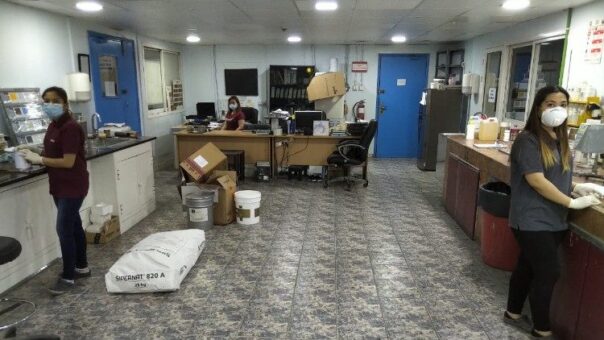 The common good The predominant value, therefore, seems to be that social capital goes together with trusting and reliable relationships, respect for the fundamental laws underpinning civil co-existence, as Pope Francis emphasizes in his Encyclical, citing Caritas in veritate of Pope Benedict XVI. Abdullah tells how he “created a fund from the company’s profits” which are also used to help his employees. “A company’s profits,” he emphasizes, “must, in my opinion, be employed both to invest in the company’s growth and obviously for the owners’ needs. But they must also be equally invested in the company’s employees. In fact, the profits are a common good: a company belongs to everyone because everyone works there, and it must serve everyone.” “At a certain point,” he continues, “I realized that beyond these necessities, my employees also had the problem of housing in their homeland. I came to understand this as I would speak with them, as we talked about our lives together. I wanted to establish a human rapport with them, not only a business one. This is community. This made me understand that there were two ways they could build a house in their countries of origin: seeking a loan from the banks (who do not lend money to the poor), or – and this was so painful for me to learn – they have to go to loan sharks because usury is very common in these countries. Thus, they have to make tremendous sacrifices over many years to pay back the money. So, I tried to understand how many people were in their families, where they wanted to build their houses and, calculating the necessary amount, we granted a loan to be paid back freely over time according to their possibilities. It is an interest-free loan, even if an interest-free loan does not really exist because there is always inflation, especially in certain countries.” Production that respects the environment During the special year inaugurated by Pope Francis to reflect on his Encyclical Laudato Si’ that goes until 24 May 2021, we asked Abdullah how his own business succeeds at responding to the urgent challenge of protecting our “common home.” “We produce some paints that are absolutely non-toxic – so, they are not harmful and do not cause pollution. Other types of products are necessarily pollutants, take solvents for example, highly used even in the pharmaceutical industry. What’s important is that they do not cause harm to the environment because we are the environment: the Pope continually recalls this. I, as an atheist, understand that the environment comprises everything that lives.” “Therefore, in the company,” he continues, “we aim to protect the workers so that their health is 100% protected, investing heavily in safety measures, in masks, ventilation systems and machines that do not release substances such as solvents. Regarding waste, we have invested a lot in machinery that separates the solid, liquid and gaseous waste products. Subsequently, public companies, under the government, come to haul them away and transfer them to appropriate and suitable places where they are disposed of properly so as to avoid polluting the environment. The sea is under us: when you dig a bit under the plant, we find the sea!”
The common good The predominant value, therefore, seems to be that social capital goes together with trusting and reliable relationships, respect for the fundamental laws underpinning civil co-existence, as Pope Francis emphasizes in his Encyclical, citing Caritas in veritate of Pope Benedict XVI. Abdullah tells how he “created a fund from the company’s profits” which are also used to help his employees. “A company’s profits,” he emphasizes, “must, in my opinion, be employed both to invest in the company’s growth and obviously for the owners’ needs. But they must also be equally invested in the company’s employees. In fact, the profits are a common good: a company belongs to everyone because everyone works there, and it must serve everyone.” “At a certain point,” he continues, “I realized that beyond these necessities, my employees also had the problem of housing in their homeland. I came to understand this as I would speak with them, as we talked about our lives together. I wanted to establish a human rapport with them, not only a business one. This is community. This made me understand that there were two ways they could build a house in their countries of origin: seeking a loan from the banks (who do not lend money to the poor), or – and this was so painful for me to learn – they have to go to loan sharks because usury is very common in these countries. Thus, they have to make tremendous sacrifices over many years to pay back the money. So, I tried to understand how many people were in their families, where they wanted to build their houses and, calculating the necessary amount, we granted a loan to be paid back freely over time according to their possibilities. It is an interest-free loan, even if an interest-free loan does not really exist because there is always inflation, especially in certain countries.” Production that respects the environment During the special year inaugurated by Pope Francis to reflect on his Encyclical Laudato Si’ that goes until 24 May 2021, we asked Abdullah how his own business succeeds at responding to the urgent challenge of protecting our “common home.” “We produce some paints that are absolutely non-toxic – so, they are not harmful and do not cause pollution. Other types of products are necessarily pollutants, take solvents for example, highly used even in the pharmaceutical industry. What’s important is that they do not cause harm to the environment because we are the environment: the Pope continually recalls this. I, as an atheist, understand that the environment comprises everything that lives.” “Therefore, in the company,” he continues, “we aim to protect the workers so that their health is 100% protected, investing heavily in safety measures, in masks, ventilation systems and machines that do not release substances such as solvents. Regarding waste, we have invested a lot in machinery that separates the solid, liquid and gaseous waste products. Subsequently, public companies, under the government, come to haul them away and transfer them to appropriate and suitable places where they are disposed of properly so as to avoid polluting the environment. The sea is under us: when you dig a bit under the plant, we find the sea!” 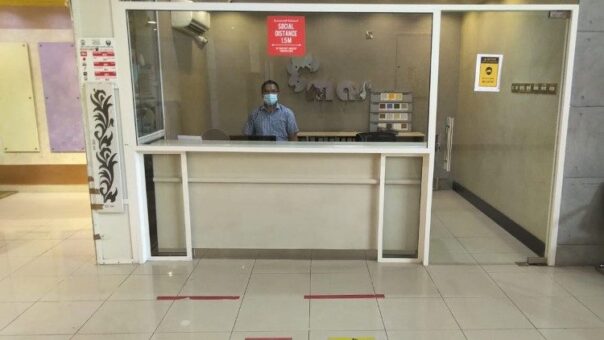 The pandemic During the world-wide coronavirus emergency, concerns for the condition of their employees grew. “The onslaught that arrived here,” Abdullah recalls, “was strong. It hit Iran, Kuwait, Saudi Arabia, all the countries around us. The hardest period, when everything was shut down, was between March and April. With the first news of the virus, we prepared measures such as the adoption of glass dividers where employees work and in reception areas, the use of surgical masks, measuring body temperature, respect for the 2-meter social distance, Covid testing for all the employees, daily coordination with the local Ministry of Health. In addition, I rented around thirty studios for safe quarantine periods.”
The pandemic During the world-wide coronavirus emergency, concerns for the condition of their employees grew. “The onslaught that arrived here,” Abdullah recalls, “was strong. It hit Iran, Kuwait, Saudi Arabia, all the countries around us. The hardest period, when everything was shut down, was between March and April. With the first news of the virus, we prepared measures such as the adoption of glass dividers where employees work and in reception areas, the use of surgical masks, measuring body temperature, respect for the 2-meter social distance, Covid testing for all the employees, daily coordination with the local Ministry of Health. In addition, I rented around thirty studios for safe quarantine periods.”  Co-existence What hits home is the word “co-existence” which Abdullah repeats a number of times in our conversation, including when he recalls his participation in the Pope’s Mass in Abu Dhabi on the occasion of Pope Francis’s journey to the United Arab Emirates at the beginning of 2019. “It was an extraordinary experience. I went with some colleagues and friends from the Focolare Movement. There were a lot of people, so many that I was outside of the stadium, on the lawn, where you could follow the event on the jumbo screens. I noted that the majority of those present were Catholics, but there even 5 thousand muslims, as well as some groups of Buddhists, Hindus and Sikhs. They transmitted the images of the moving embrace with the Grand Imam of Al-Azhar, Ahmed el-Tayeb. It was a liberating moment of an encounter between the Islamic world and the western world, with the Pope who had come here with such great humility: he thanked the country, the authorities, the people, in the spirit of co-existence, peace, tolerance. He wanted to say that living together is possible.”
Co-existence What hits home is the word “co-existence” which Abdullah repeats a number of times in our conversation, including when he recalls his participation in the Pope’s Mass in Abu Dhabi on the occasion of Pope Francis’s journey to the United Arab Emirates at the beginning of 2019. “It was an extraordinary experience. I went with some colleagues and friends from the Focolare Movement. There were a lot of people, so many that I was outside of the stadium, on the lawn, where you could follow the event on the jumbo screens. I noted that the majority of those present were Catholics, but there even 5 thousand muslims, as well as some groups of Buddhists, Hindus and Sikhs. They transmitted the images of the moving embrace with the Grand Imam of Al-Azhar, Ahmed el-Tayeb. It was a liberating moment of an encounter between the Islamic world and the western world, with the Pope who had come here with such great humility: he thanked the country, the authorities, the people, in the spirit of co-existence, peace, tolerance. He wanted to say that living together is possible.”
By Giada Aquilino – Vatican News
Oct 22, 2020 | Non categorizzato
Maria Voce: “Immense suffering and unconditional collaboration by the Movement so as achieve clarity; the establishment of an independent inquiry after a meeting with some victims of a former consecrated member of Focolare”. “Faced with this immense suffering, we are convinced that the only path to follow is that of offering the victims full attention and recognition of the harm done. I wish here to reiterate the Movement’s full and unconditional collaboration, to shed full light on the facts and do justice to the victims.” This is what Maria Voce, President of the Focolare Movement, said in a press release dated 22nd October 2020 on the case of violence against minors by J.M.M. a former consecrated member of the Focolare, who lives in France. A victim has made his case public, which goes back to 1981 and 1982 when – aged 15 – he was sexually molested. An independent body is being established through which the Focolare Movement has decided to initiate a special inquiry, after the meeting with some victims on 18th September 2020. On that occasion Jesús Morán, Co-president of the Focolare Movement, expressed his pain and shame for the abuses suffered “and also for the silence or lack of initiative sustained for years on the part of various people in positions of responsibility”. The composition of the independent body will be made public shortly. Its task will be to listen to the victims and to gather further testimonies, as well as investigating whether there were any omissions, cover ups or silences on the part of those responsible for the Movement. At the end of the investigation, the independent Body will make its final report public. In the interests of the completeness of the investigation and to guarantee full transparency, the two people co-responsible for the Focolare in France and one of the people co-responsible for the Movement in Western Europe offered their resignation from their respective roles on 21st October 2020. These were accepted by the Focolare President.
Joachim Schwind
Press release
Oct 21, 2020 | Non categorizzato
On August 11th we celebrated Danilo Zanzucchi’s 100th birthday. He and his wife Anna Maria were responsible for the New Families Movement for over 40 years. Theirs is a very rich story, a story of love given, received and generated. We went to visit them at their home in Grottaferrata…
https://vimeo.com/465833515
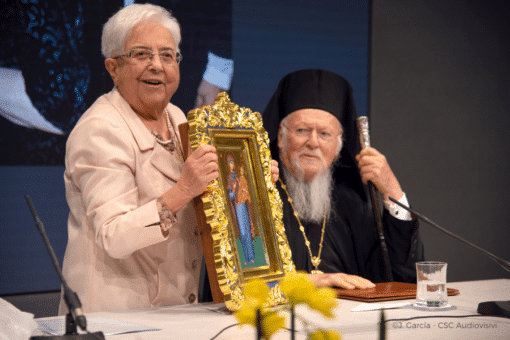
Oct 20, 2020 | Non categorizzato
This morning His Holiness Bartholomeo 1, Ecumenical Patriarch of Constantinople paid a visit to the international centre of the Focolare Movement in Rocca di Papa. He was welcomed by Focolare President Maria Voce, who escorted him to visit the house where founder Chiara Lubich lived. He then prayed at her tomb. Joined by Co-President Jesús Morán and a small Focolare delegation, there followed an exchange of greetings and gifts. The Patriarch was in Rome for the international Prayer for Peace meeting promoted by the Community of Sant’Egidio being held at the Campidoglio (Capitoline Hill) today. Tomorrow he will receive an Honorary Doctorate in Philosophy from the Antonianum University. The Patriarch will also be meeting with Pope Francis.
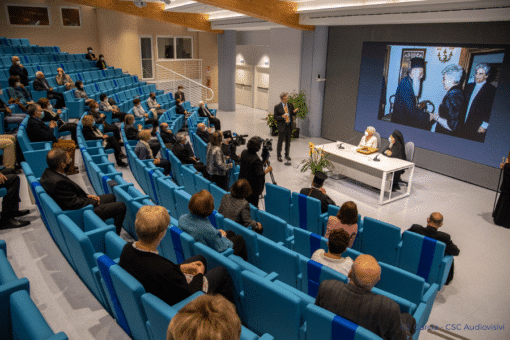
©J. García – CSC Audiovisivi
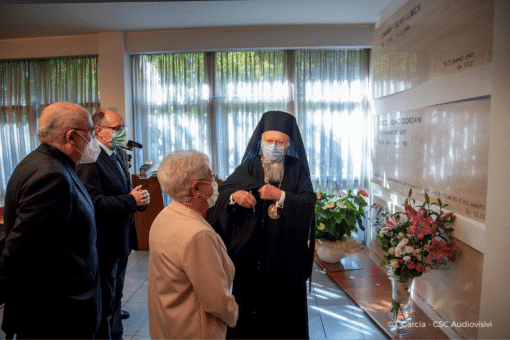
©J. García – CSC Audiovisivi

©J. García – CSC Audiovisivi
Stefania Tanesini
To read the homily of His Holiness Bartholomew, Archbishop of Constantinople, click here https://vimeo.com/470297305
Oct 20, 2020 | Non categorizzato
On Tuesday 20 October in Rome the International Prayer Meeting for Peace will take place: participants will include representatives of world religions. The initiative is being promoted by the Sant’Egidio Community. Maria Voce, president of the Focolare Movement will also be present. The event can be followed via streaming. “We are very happy that this meeting can take place because we need words of peace, words of hope, words that indicate a future for humanity that is overwhelmed by this pandemic.” This is how Marco Impagliazzo, president of the Sant’Egidio Community, presented the 2020 International Prayer Meeting for Peace. The event will be inspired by the spirit of Assisi and will be attended by representatives of the great world religions. It is entitled “Nobody is Saved Alone – Peace and Fraternity” and will take place today, 20 October, in Rome, Italy in Piazza del Campidoglio. It will gather together members of different faiths and representatives of many different institutions for a solemn moment of reflection that aims to offer a message of hope for the future. During this event there will be time for prayer, each according to his or her own tradition. A number of speakers will also offer interventions highlighting the contribution of religions in building a better future of peace and fraternity, especially now that the pandemic is causing widespread social and economic suffering. The president of the Focolare Movement, Maria Voce, will be among the participants. The event is scheduled to begin at 4.30 p.m. (utc+2) when the religious representatives will gather in different locations for prayer. Christians will meet for ecumenical prayer in the Basilica of St. Mary in Aracoeli (click here for the programme). At approximately 5.20 p.m. (utc+2) the meeting will take place in Piazza di Campidoglio. During the ceremony, keynote addresses will be given by Sergio Mattarella, the President of the Italian Republic, Andrea Riccardi, the founder of the Sant’Egidio Community and Ursula von der Leyen, the President of the European Commission who has recorded a video message. Interventions will also be made by the Patriarch of Constantinople, Bartholomew I, the Chief Rabbi of France, Rav Haim Korsia, the Secretary General of the Superior Committee of the Human Fraternity, Dr. Mohamed Abdelsalam Abdellatif, from the Ven. Shoten Minegishi (Soto Zen Buddhism), Dr. Karmaljit Singh Dillon (Sikh Gurdwara Parbandhak National Committee) and Mrs. Divya Punchayil Prashoban (Hinduist representative). Pope Francis will conclude this part of the meeting. The ceremony will then continue with a minute’s silence in memory of the victims of the pandemic and of all wars, the reading of the 2020 Appeal for Peace which will be delivered by a group of children to the ambassadors and representatives of national and international politics and the lighting of the peace candle by Pope Francis. The “Prayer Meeting for Peace” will be broadcast in full live streaming on the event website and on the social channels of the Sant’Egidio Community.
Lorenzo Russo

 “He had a vision: a door was open in heaven…”. With these words, taken from the book of Revelation, the Metropolitan Gennadios Zervos, Orthodox Archbishop of Italy and Malta, loved to describe – with a gaze full of wisdom – the meeting between Patriarch Athenagoras and Chiara Lubich. Athenagoras used to say, “because if the door is now open, we are called to go inside together: to share in the wonder and joy of the divine gift of Unity”. I cannot find more appropriate words to describe the flame that lit the heart and illuminated the action of Metropolitan Gennadios. He was an extraordinary and tireless apostle of Unity between the Church of the East and the Church of the West that we have known since the Second Vatican Council until today. His work began way back in 1960, when he arrived in Italy from his native Greece, sent by Patriarch Athenagoras. A humble and ardent disciple of the Eastern Church with its two-thousand-year-old tradition. A tradition impersonated by the prophetic figure of Patriarch Athenagoras, and in which Metropolitan Gennadios had been formed from the time of his studies at the historic Theological School of Chalki, an experience he had shared with the future Patriarch Bartholomew; and in the charism of unity given by the Holy Spirit to Chiara Lubich for the whole Church of our time, beyond confessional distinctions. He thus lived, as an active and discreet protagonist, the great progress inaugurated by the reconciliation between Rome and Constantinople at the close of Vatican II, sealed by the historic embrace between Pope Paul VI and Patriarch Athenagoras in Jerusalem. He continued then with tenacity and without hesitation on this road, contributing in a unique way, in Italy, to the mutual knowledge of the two sister Churches. Along the journey he joyfully nourished himself with the light of the charism of unity. Metropolitan Gennadios animated his ministry in the Orthodox Diocese of Italy and Malta, with this spirit leading the diocese with foresight as Archbishop – the first after almost three centuries – to a magnificent flowering in the constant search for communion with the Catholic Church and in a sincere dialogue with all. Finally, as if it were the precious legacy he wanted to leave us, he intensely desired the Ecumenical Chair Patriarch Athenagoras-Chiara Lubich at the Sophia University Institute in synergy with the Ecumenical Patriarchate of Constantinople: “a sign” – he stressed on the day of the inauguration – “of our infinite love for these two extraordinary protagonists of the dialogue of love”. With amazement and gratitude, I am a witness of how close to his heart this last initiative was. For him, it was a new contribution so that the ‘miracle’ rained down from Heaven might continue. ‘Miracle’ is how he described the meeting between Athenagoras and Chiara – Chiara had become a living bridge between the Patriarch of Constantinople and the Pope of Rome, Paul Vl. He even considered it indispensable to the ecumenical journey towards full and visible unity: “the love between Athenagoras, Chiara and Paul VI “- he repeated – “is such a powerful reality that no one can erase it anymore, because it is the presence of Jesus in their midst”. With immense gratitude we gather from his hands the witness he transmits to us. As we remembering him , we are deeply moved by the words of Patriarch Bartholomew who wanted to celebrate his many and luminous charisms in which we rejoiced, and which we now contemplate in a fuller light: “among them the greatest are humility and gentleness, peace and wisdom, and the greatest of all love and faith towards Mother Church”.
“He had a vision: a door was open in heaven…”. With these words, taken from the book of Revelation, the Metropolitan Gennadios Zervos, Orthodox Archbishop of Italy and Malta, loved to describe – with a gaze full of wisdom – the meeting between Patriarch Athenagoras and Chiara Lubich. Athenagoras used to say, “because if the door is now open, we are called to go inside together: to share in the wonder and joy of the divine gift of Unity”. I cannot find more appropriate words to describe the flame that lit the heart and illuminated the action of Metropolitan Gennadios. He was an extraordinary and tireless apostle of Unity between the Church of the East and the Church of the West that we have known since the Second Vatican Council until today. His work began way back in 1960, when he arrived in Italy from his native Greece, sent by Patriarch Athenagoras. A humble and ardent disciple of the Eastern Church with its two-thousand-year-old tradition. A tradition impersonated by the prophetic figure of Patriarch Athenagoras, and in which Metropolitan Gennadios had been formed from the time of his studies at the historic Theological School of Chalki, an experience he had shared with the future Patriarch Bartholomew; and in the charism of unity given by the Holy Spirit to Chiara Lubich for the whole Church of our time, beyond confessional distinctions. He thus lived, as an active and discreet protagonist, the great progress inaugurated by the reconciliation between Rome and Constantinople at the close of Vatican II, sealed by the historic embrace between Pope Paul VI and Patriarch Athenagoras in Jerusalem. He continued then with tenacity and without hesitation on this road, contributing in a unique way, in Italy, to the mutual knowledge of the two sister Churches. Along the journey he joyfully nourished himself with the light of the charism of unity. Metropolitan Gennadios animated his ministry in the Orthodox Diocese of Italy and Malta, with this spirit leading the diocese with foresight as Archbishop – the first after almost three centuries – to a magnificent flowering in the constant search for communion with the Catholic Church and in a sincere dialogue with all. Finally, as if it were the precious legacy he wanted to leave us, he intensely desired the Ecumenical Chair Patriarch Athenagoras-Chiara Lubich at the Sophia University Institute in synergy with the Ecumenical Patriarchate of Constantinople: “a sign” – he stressed on the day of the inauguration – “of our infinite love for these two extraordinary protagonists of the dialogue of love”. With amazement and gratitude, I am a witness of how close to his heart this last initiative was. For him, it was a new contribution so that the ‘miracle’ rained down from Heaven might continue. ‘Miracle’ is how he described the meeting between Athenagoras and Chiara – Chiara had become a living bridge between the Patriarch of Constantinople and the Pope of Rome, Paul Vl. He even considered it indispensable to the ecumenical journey towards full and visible unity: “the love between Athenagoras, Chiara and Paul VI “- he repeated – “is such a powerful reality that no one can erase it anymore, because it is the presence of Jesus in their midst”. With immense gratitude we gather from his hands the witness he transmits to us. As we remembering him , we are deeply moved by the words of Patriarch Bartholomew who wanted to celebrate his many and luminous charisms in which we rejoiced, and which we now contemplate in a fuller light: “among them the greatest are humility and gentleness, peace and wisdom, and the greatest of all love and faith towards Mother Church”. 

 “It is essential to train and support the new generations of economists and entrepreneurs” to adopt a new model of development that “does not exclude but includes” and does not generate inequalities. Speaking to economists and bankers, the Pope highlighted the urgency of an “ecological reconversion” of the economy and stressed the decisive role of young people. He invited them to discuss these issues in Assisi (Italy), where St Francis “stripped himself of everything to choose God as the guiding light of his life, he made himself poor with the poor (…). His choice of poverty gave rise to a vision of the economy that is very up to date”. The meeting, entitled Economy of Francesco, will be held online from November 19th to 21st. Maria Gaglione, from the organising team, collected the participants’ stories: “The young people who responded to the Pope’s call are economists, researchers, scholars and university professors, entrepreneurs, students, activists and changemakers from 115 countries around the world. They are themselves “builders” of a fairer, more fraternal economy, aiming at inclusion. The universities, businesses and communities where they operate are “workshops of hope”, as the Pope defines them. Their motto is “No one left behind”, because they want an economy that leaves no one behind. In this way, they resemble St Francis who chose a new life to dedicate himself to those who are the least”.
“It is essential to train and support the new generations of economists and entrepreneurs” to adopt a new model of development that “does not exclude but includes” and does not generate inequalities. Speaking to economists and bankers, the Pope highlighted the urgency of an “ecological reconversion” of the economy and stressed the decisive role of young people. He invited them to discuss these issues in Assisi (Italy), where St Francis “stripped himself of everything to choose God as the guiding light of his life, he made himself poor with the poor (…). His choice of poverty gave rise to a vision of the economy that is very up to date”. The meeting, entitled Economy of Francesco, will be held online from November 19th to 21st. Maria Gaglione, from the organising team, collected the participants’ stories: “The young people who responded to the Pope’s call are economists, researchers, scholars and university professors, entrepreneurs, students, activists and changemakers from 115 countries around the world. They are themselves “builders” of a fairer, more fraternal economy, aiming at inclusion. The universities, businesses and communities where they operate are “workshops of hope”, as the Pope defines them. Their motto is “No one left behind”, because they want an economy that leaves no one behind. In this way, they resemble St Francis who chose a new life to dedicate himself to those who are the least”. 

 They are Pakistani, Indian, Nepalese, Filipino, Nigerian, Cameroonian, Senegalese. What they share in common is a past marked by severe poverty that forced them to leave their homeland and family to emigrate, and a present that seeks to keep them from experiencing exploitation and new hardships. They number about 212, the employees of
They are Pakistani, Indian, Nepalese, Filipino, Nigerian, Cameroonian, Senegalese. What they share in common is a past marked by severe poverty that forced them to leave their homeland and family to emigrate, and a present that seeks to keep them from experiencing exploitation and new hardships. They number about 212, the employees of  The common good The predominant value, therefore, seems to be that social capital goes together with trusting and reliable relationships, respect for the fundamental laws underpinning civil co-existence, as Pope Francis emphasizes in his Encyclical, citing
The common good The predominant value, therefore, seems to be that social capital goes together with trusting and reliable relationships, respect for the fundamental laws underpinning civil co-existence, as Pope Francis emphasizes in his Encyclical, citing  The pandemic During the world-wide coronavirus emergency, concerns for the condition of their employees grew. “The onslaught that arrived here,” Abdullah recalls, “was strong. It hit Iran, Kuwait, Saudi Arabia, all the countries around us. The hardest period, when everything was shut down, was between March and April. With the first news of the virus, we prepared measures such as the adoption of glass dividers where employees work and in reception areas, the use of surgical masks, measuring body temperature, respect for the 2-meter social distance, Covid testing for all the employees, daily coordination with the local Ministry of Health. In addition, I rented around thirty studios for safe quarantine periods.”
The pandemic During the world-wide coronavirus emergency, concerns for the condition of their employees grew. “The onslaught that arrived here,” Abdullah recalls, “was strong. It hit Iran, Kuwait, Saudi Arabia, all the countries around us. The hardest period, when everything was shut down, was between March and April. With the first news of the virus, we prepared measures such as the adoption of glass dividers where employees work and in reception areas, the use of surgical masks, measuring body temperature, respect for the 2-meter social distance, Covid testing for all the employees, daily coordination with the local Ministry of Health. In addition, I rented around thirty studios for safe quarantine periods.” 

